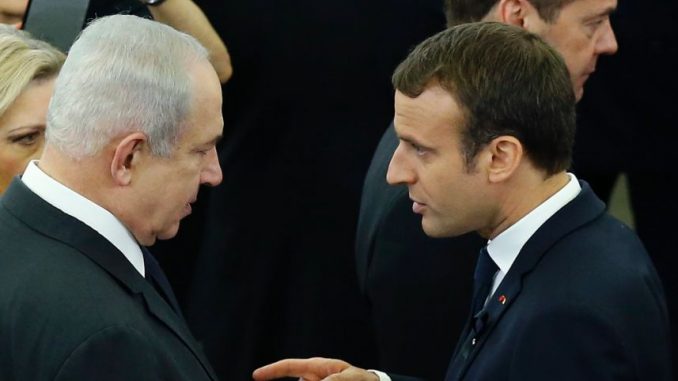‘The Palestinian issue is complicated,’ Netanyahu told the French president. Macron agreed but replied: ‘You’re making it more complicated by building in the settlements’

Israeli Prime Minister Benjamin Netanyahu speaks to French President Emmanuel Macron during a memorial ceremony in honor of late former German Chancellor Helmut Kohl, in Strasbourg, July 1, 2017. FRANCOIS LENOIR/REUTERS
Prime Minister Benjamin Netanyahu told French President Emmanuel Macron in their meeting Sunday that he was skeptical about the peace efforts being made by U.S. President Donald Trump, diplomatic sources familiar with the conversation told Haaretz.
During the meeting in Paris, Macron told Netanyahu that he supports Trump’s efforts and that the settlement-building plans that Israel has advanced in the past six months have made an already complicated situation that much harder, the sources said.
Most of the leaders’ conversation revolved around subjects that Netanyahu was more eager to discuss, such as the cease-fire in Syria, the growing threat from Hezbollah in Lebanon, the Iranian nuclear program and economic cooperation between Israel and France. But a portion was devoted to the settlements and the Trump administration’s efforts to revive Israeli-Palestinian peace talks.
The sources say that when Macron raised the Israeli-Palestinian issue, he asked Netanyahu what he thought of the peace initiative promoted by the previous French government of President François Hollande.
In June 2016 and January 2017, France convened summits attended by dozens of foreign ministers from around the world who backed the resumption of the peace process. But these events produced only symbolic declarations and neither was attended by Israelis or Palestinians. The Palestinians voiced support for the move, while the Israelis were sharply opposed.
“I’m against the French peace initiative. It was a bad initiative,” Netanyahu told Macron, the sources say.
According to the sources, Macron did not contradict Netanyahu and seemed to feel no obligation to adopt the initiative he inherited from his predecessor. But Macron asked Netanyahu, if not the French initiative, then what? What did Netanyahu want to do to advance the peace process?
According to the sources, Netanyahu showed Macron a map of the Middle East with each country colored based on where it fits in the regional alignment of powers. He also brought a video about incitement in the Palestinian media against Israel – the same video he showed Trump during his Jerusalem visit, which prompted Trump to confront Palestinian President Mahmoud Abbas about the matter.
“The Palestinian issue is complicated,” Netanyahu told Macron, the sources say, adding that Macron agreed but replied, “The problem is that you’re making it more complicated by building more and more in the settlements.”
Although the discussion of the settlements lasted less than five minutes, Macron made it clear that his government would continue to oppose the settlements and consider them illegal.
According to the sources, Netanyahu said it would be a mistake to treat all the West Bank settlements as a single entity. He said that much of the construction was in settlement blocs that Israel would retain in any peace agreement, and that even if a final-status accord were reached, he would not evacuate settlements because there was no reason Jews could not live in a Palestinian state.
Macron told Netanyahu that during Trump’s visit to Paris last week, the U.S. president spoke about his attempt to advance the peace process. Macron told Netanyahu he supports Trump’s initiative.
“With the current situation in the Middle East, there is an opportunity for peace,” Macron said, according to the sources, but Netanyahu was more skeptical. He agreed that an opportunity had arisen, but more in terms of Israel’s relations with the Sunni Arab states.
“It will be complicated to move quickly with the American plan,” the sources quoted Netanyahu as saying. “I don’t know if Abbas can supply the goods because of his internal politics. But we will cooperate with Trump’s move. I want to see a parallel process with the Arab states alongside the process with the Palestinians. Not one at the expense of the other, or one before the other, but in tandem.”
Israeli officials say Netanyahu left the meeting with Macron in high spirits and their agreements far outnumbered their disagreements. Netanyahu did not get the impression that the new French president was keen to pursue a peace initiative like his two predecessors, or that their differences on the Palestinian issue would cast a pall on the countries’ relations.
Under presidents Hollande and Nicolas Sarkozy, relations with Netanyahu and his government also got off to a warm start. But eventually the situation in the West Bank and Gaza, combined with France’s long-standing desire to play a role in the peace process, exacerbated the disputes, causing tensions to rise and crises to occur.



Bibi can not just say the Two State Concept is null and void and we are working on something else. He has his time buyer now the Arab States must normalize in tandem with progress on normalizing relations with Israel. Since that is highly unlikely he gives nothing. The status quo remains.
So we do not apply Israeli civil law to any of the blocks or area C? Most important is to build in E1 and all the Jewish Towns of Judea/Samaria.
As long as Bibi feels unable to accept the idea of retaining all settlements as part of Israel and while we’re about it, area C, we will always have this issue of the so-called TSS which we all know cannot work.
If he can’t get his mind around that, it’s time to go before he makes any more mistakes of the Obama type.